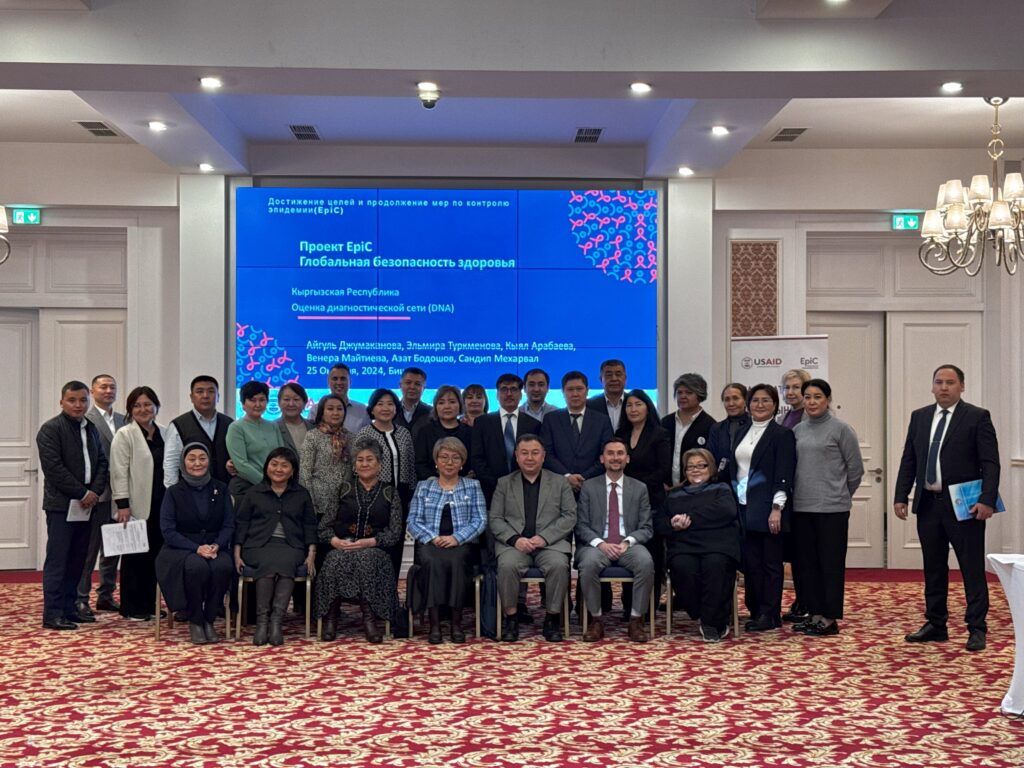Gulsina Ablasova, EpiC Kyrgyzstan Communications Officer
In a significant move toward enhancing the Kyrgyz Republic’s health security, in July 2024, the Meeting Targets and Maintaining Epidemic Control (EpiC) project in Kyrgyzstan conducted verification visits to 44 laboratories in collaboration with six national laboratory services—the Department of Disease Prevention and State Sanitary and Epidemiologic Surveillance (DDPSSES), Republican Center for Control of Quarantine and Especially Dangerous Infections (RCCQEDI), Republican Center for Control of Hemocontact Viral Hepatitis and HIV (RCCHVH and HIV), the National TB Center (NTBC), Veterinary Laboratory Service, and Clinical and Diagnostic Laboratory Service. These visits to laboratories at various levels were part of a national Diagnostic Network Assessment to identify strengths and areas for improvement within the national diagnostic network. Importantly, the assessment involved both human and veterinary laboratories, reflecting a One Health approach that recognizes the interconnectedness of human, animal, and environmental health.
The verification visits found that all six laboratory services had appropriate terms of reference and the required manuals and standard operating procedures; however, building and equipment conditions varied widely. Almost all laboratories reported managing waste according to international guidelines either on site or through a contracted company, but clarity was lacking on waste disposal procedures once the waste was collected. Finally, while there was commitment to One Health at the national level, more coordination was found to be needed across services at the regional and district levels, and most staff reported being overburdened and underpaid.
SUMMARY OF RECOMMENDATIONS
The assessment identified several gaps and challenges and provided actionable recommendations, including the following:
- The current National Laboratory Strategic Plan (NLSP) (2016–2024) lacks specific targets, timelines, and funding. The new 2025 strategy should include these elements, align with the National Action Plan for Health Security (NAPHS) and National Programme “Healthy person – prosperous country” (HPPC) (2019–2030), and cover the private sector.
- The Ministry of Health mandates 24-hour disease reporting but lacks detection and response timelines. Updating the emergency response plan to align with the 7-1-7 framework—a standardized benchmark for evaluating how well countries detect and respond to infectious disease outbreaks—could improve public health.
- Many laboratory policies are outdated and need to be updated, and building requirements, transport guidelines, and waste management policies are needed.
- Rapid testing gaps cause diagnosis delays and higher costs. Developing a National Essential Diagnostic List (NEDL) and updating testing packages would likely improve early diagnosis and outbreak response.
- The private sector lacks a regulatory mechanism for public health engagement, hindering collaboration. Establishing this mechanism and standardized protocols would enhance health crisis response.
On October 25, 2024, EpiC held a large stakeholder meeting to disseminate the findings and recommendations of the assessment, with the participation of national stakeholders from the relevant ministries and departments, as well as development actors involved in laboratory system strengthening activities in the country, including USAID, the World Health Organization, the Food and Agriculture Organization, the U.S. Centers for Disease Control and Prevention, the World Bank, GIZ, and JSI. This assessment of human and animal health laboratories was well-received as a positive initiative toward strengthening One Health intersectoral coordination and collaboration. The development partners have also shared their planned activities aimed at closing some of the gaps identified in the assessment.

The insights gained from these visits will be instrumental in supporting the government to develop a comprehensive action plan. The recommendations will offer robust strategies to strengthen the country’s diagnostic network, ensuring it is adequately prepared to address current and future challenges. The process demonstrates the commitment of all stakeholders to creating a robust and reliable laboratory network that can effectively respond to the evolving health needs of the Kyrgyzstani people.
Laboratory services play a pivotal role in the rapid detection of infectious diseases, making this initiative a critical step in supporting the Kyrgyz Republic government’s preparedness and response capabilities for potential pandemics and public health emergencies. By identifying and addressing gaps in the current system, this collaborative effort will serve to strengthen the overall health infrastructure in the Kyrgyz Republic, ultimately enhancing the nation’s resilience in the face of any health crisis.
Featured image: DNA verification visit to the Chui Oblast Centre for Diagnostics of HIV and Viral Hepatitis. Photo by EpiC Central Asia

